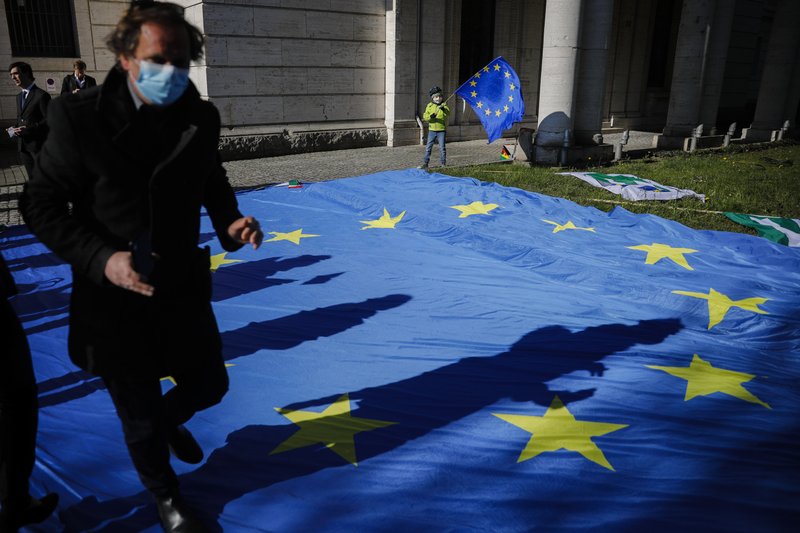
(Photo: AP)
European Union leaders are preparing for a new virtual summit to take stock of the damage the coronavirus has inflicted on the lives and livelihoods of around half a billion citizens and to thrash out a more robust plan to revive their ravaged economies.
As some Europeans take their first tentative steps out of confinement to return to work or school, and as businesses on the continent cautiously open their doors, the leaders will endorse urgent spending measures and debate a massive recovery plan they hope to introduce in coming weeks.
Around 1 million people in Europe and Britain have now tested positive for the coronavirus and more than 100,000 of them have died — over half of the world’s death toll — according to the European Centre for Disease Prevention and Control. But experts believe official figures vastly understate the true toll of the pandemic, due in part to limited testing and difficulties in counting the dead during the crisis.
Thursday’s EU summit, the fourth video conference between the 27 EU leaders since the outbreak struck northern Italy two months ago, comes at an extremely delicate time.
Trust between them has eroded, with hard-hit Italy and Spain lacking confidence that relatively wealthier northern EU partners like Austria, the Netherlands or Germany — who have suffered less in the pandemic — are willing to take swift, sweeping measures backed by real economic firepower.
“This pandemic touches all of us in every member state and in every household. It knows no boundaries and calls for even more coordination and unity. It is my conviction that we must show even greater determination in overcoming our differences,” European Council President Charles Michel said in his summit invitation letter.
Still, it’s not as if Europe has been sitting on its hands. Combined, the EU’s institutions and nations have mobilized around 3.3 trillion euros ($3.6 trillion) to help over-burdened health services, suffering small businesses, embattled airlines and the newly jobless.
The leaders are expected Thursday to endorse a package worth 540 billion euros ($587 billion) that would help pay lost wages, keep companies afloat and fund health care systems.
“The aim should be for these three safety nets to be in place and operational” by June 1, Michel said.
Drawing up a recovery plan that can be endorsed by the EU’s diverse array of members will be more challenging. The consensus is that it should total at least 1 trillion euros and target the economic sectors and European regions hit hardest by the coronavirus.
Spain says the bloc should provide grants to countries based on the percentage of their population affected, their drop in economic growth and on job losses. The fund should be linked to the EU’s new long-term budget with plenty of spending up front for 2-to-3 years.
But The Netherlands, backed by Austria and Germany, refuses to contemplate debt sharing plans that might leave it having to foot the bill for economic damage inflicted elsewhere. It’s also reluctant to use every lever available, preferring to keep some options in reserve should a second wave of infections hit.
It’s not a position shared by France. “The key thing is the ability to issue common debt, to have a common guarantee, to fund expenses in certain countries,” French President Emmanuel Macron said in an interview with the Financial Times newspaper.
The crisis has raised troubling questions about EU solidarity and the future of the entire European project, and Macron said the funding should focus on those most in need “because we decided to have a shared journey. If at this point in history we don’t do it, there will no longer be any shared adventure.”
The EU’s powerful executive arm, the European Commission, has the job of drawing up a recovery plan based on Thursday’s discussions. A top French official said an agreement on Thursday is highly unlikely, because “any hasty deal would be a bad deal.”
“We need to be able to make a definitive decision in the coming weeks” so that the recovery plan can leap into action by summertime, the official said, speaking anonymously in accordance with the French presidency’s customary practices.
In the weeks ahead, the commission will also publish a new proposal for the EU’s next 7-year budget, which many countries want to front-load with emergency funds to tackle the crisis. But countries are divided over that trillion-euro spending package too, notably over how to plug an estimated 75-billion-euro gap left by Britain’s departure from the bloc.
Whatever the outcome Thursday, few have illusions about the size of the challenge or the speed at which new hurdles are approaching.
“We are facing the worst economic downturn since the Great Depression. This calls for urgent and decisive action,” Eurogroup President Mario Centeno said Tuesday. “The recovery starts when the lockdown begins to end, and we expect this to occur in the coming weeks. So, this needs to be quick.”


